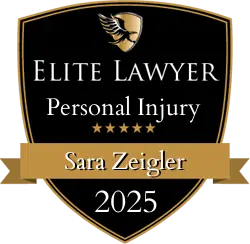Accidents involving large trucks are some of the most complicated on West Virginia’s roads. Truck accidents cause the most severe injuries, involve high damages, and legal issues that extend far beyond accidents involving passenger vehicles. Determining liability, or fault, for a truck accident is never easy. Many potential parties could be liable, including the truck driver, the trucking company, or third parties, such as cargo loading companies.
Federal trucking regulations and legal standards in the state play an important role in determining liability in West Virginia truck accidents. Below, our West Virginia truck accident lawyer outlines how to determine liability after this type of serious crash.
How to Prove Negligence in West Virginia Truck Accidents
Most truck accidents in West Virginia rely on the legal concept of negligence. Any time a person does not act with reasonable care and causes harm to someone else, they can legally be held liable. When filing a claim after an accident with a truck, you must prove four elements of your case. These include:
- Duty of care: Truck drivers and the companies they work for have a legal obligation to operate responsibly and to comply with safety regulations. This includes maintaining trucks, obeying speed limits, properly loading cargo, and complying with the hours of service rule.
- Breach of duty: When a person or entity violates the safety rules by ignoring federal law, not performing necessary inspections, or speeding, they have breached their duty of care. Proving a breach of duty of care involves proving the negligent act that caused the accident and often relies on evidence such as the truck’s black box data.
- Causation: You must also establish the direct link between the breach of duty and the accident that caused your injuries. For example, you cannot file a claim simply because a truck driver was speeding. You can only file a claim if you can prove that the speeding caused the accident.
- Damages: Truck accident claims are meant to restore you as wholly as possible to the condition you were in before the accident. If you did not suffer any losses or damages, there is nothing to compensate for, and so, there is no claim. You must fully prove all the damages you sustained, such as medical expenses, lost income, pain and suffering, and more.
Important Evidence Needed to Prove Liability in West Virginia Truck Accidents
Proving liability in a truck accident claim requires strong evidence. Some of the best types of evidence in these cases are as follows:
- Police reports: Under West Virginia Code §17C-4-6, you must report any auto accident that results in injury, death, or property damage exceeding $1,000. There is little chance that truck accident victims will walk away from a crash uninjured and without any property damage. After law enforcement visits the scene, they will write and file a report, which can then be used as evidence. Police reports can outline how the crash occurred and even indicate fault.
- Black box data: Most commercial trucks today have event data recorders (EDRs), more commonly known as black boxes, installed in them. These devices capture brake usage, the speed of the vehicle, and other information pertaining to the seconds leading up to an accident.
- Truck company records and driver logs: Federal law requires truck drivers to log their hours of service, rest periods, and routes. Comparing a truck driver’s logs with GPS information can reveal violations or falsifications. Hiring practices and maintenance records can also indicate trucking company negligence.
- Eyewitness testimony: People who saw the crash can provide impartial accounts of how the accident occurred. Due to the fact that witnesses have nothing to lose or gain, their testimony is given substantial weight.
Determining Truck Accident Liability in West Virginia
Determining liability is one of the most complex aspects of a truck accident claim. One reason for this is that there are multiple parties that can be held liable. They are as follows:
- Truck drivers: Impaired driving, speeding, and other negligent acts by a truck driver can easily cause a crash.
- Trucking companies: When truck drivers and other employees act carelessly and cause a crash, the trucking company can be held liable. This is a legal concept known as vicarious liability. Trucking companies can also be held liable for their own negligence, such as failing to properly hire or train drivers.
- Third parties: Multiple third parties can be held liable for an accident. These include cargo loading companies that improperly loaded cargo onto a truck, maintenance companies that failed to properly service trucks, and others.
- Manufacturers: Manufacturers have a legal obligation to ensure the parts and trucks they create are safe and free of defective parts. When they fail to do this, they can be held liable for their own negligence.
- Government entities: If missing road signs, improper road design, and other factors contribute to a crash, the government entity responsible for designing and maintaining the roads can be held liable.
ZIP Codes We Service
Our West Virginia truck accident lawyers are happy to help clients throughout the state. If you are in one of the following ZIP codes, we can assist with your case:
- 25002
- 24701
- 25306
- 25309
- 25311
- 25312
- 24740
- 26003
- 24740
- 25420
Regardless of where you are in West Virginia, our experienced attorneys can help if you have been hurt in a crash.
Our Truck Accident Lawyer in West Virginia Can Help
Of all the different types of crashes on the road, accidents with trucks are some of the most serious and most likely to cause catastrophic injuries. If you or someone you love has been hurt, our West Virginia truck accident lawyer at Kaufman & McPherson can help. We can conduct a full investigation, determine who is liable for your injuries, and help you obtain the full and fair settlement you are entitled to. Contact us online to schedule a consultation and to get the legal help you need after a crash.








